¶ WE NEED A PRIMER ON TERRORISM. This is not it, but it is a start.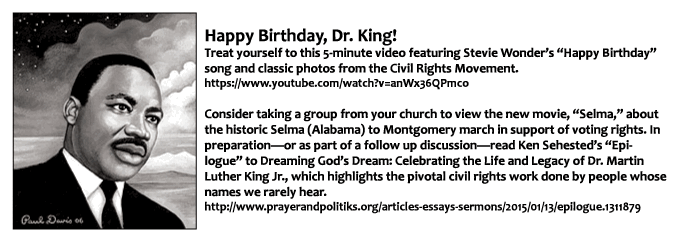
You are encouraged to add your own comments, or offer a favorite quote, in the “reader comments” at bottom.
¶ Hundreds, probably thousands, of editors and commentary writers worked late into the night last week, scouring a thesaurus in search of uncommon adjectives sufficient to the task of communicating the heinous killings in and around Paris, France, beginning with the 7 January jihadist attack that killed a dozen in the editorial office of Charlie Hebdo magazine.
¶ Swallowed in global attention to this horror was the bombing, a day before, at the NAACP office in Colorado Springs, Colorado. The Southern Poverty Law Center currently tracks 939 “hate groups” operating in 49 of the 50 states in the US, in addition to Washington, DC. These groups “have beliefs or practices that attack or malign an entire class of people, typically for their immutable characteristics.”
¶ My personal grief is not mitigated by my distaste for Charlie Hebdo’s style of humor, which the creative artist Josh Healey describes as “such a problematic hero. Since the attacks, the American media has taken to calling the French publication a ‘satirical’ magazine. . . . It is closer to the bastard lovechild of Bill Maher and Rush Limbaugh, with all of their nastiness and even worse jokes. . . . In a country [France] and an era (post-9/11) where Muslims face rampant discrimination and often violent exclusion, Charlie Hebdo's cheap shots at Islam added fuel to the racist fire. I understand the desire to make fun of organized religion in all its absurdities, but it's possible to do that without graphic cartoons of Muhammad being sodomized.” —Josh Healey, “I Will Grieve. I Will Laugh. But I Am Not Charlie
 ¶ Though if I were in France I would have been among the 4 million marchers last Sunday, publicly declaring “not afraid,” for principles are not bound by personal preferences.
¶ Though if I were in France I would have been among the 4 million marchers last Sunday, publicly declaring “not afraid,” for principles are not bound by personal preferences.
¶ My local paper was among those who printed passionate and articulate perspectives on these atrocities. Though one sentence fairly took my breath away: “Even amid today’s tolerance in the US the occasional rogue Christian such as Timothy McVeigh will commit an act of terror.” In 1995, McVeigh, together with Terry Nichols, exploded a bomb at the Murrah Federal Building in Oklahoma City, killing 168 people.
¶ Are our “rogues” limited to “occasional Christians” of recent memory? Does “today’s tolerance” not admit (among others) the history of Ku Klux Klan reigns of terror?
¶ Speaking of McVeigh: He confessed that he almost didn’t go through with the Murrah Federal Building bombing when he learned there was a daycare center in the building. But he decided that was unavoidable “collateral damage.” McVeigh was a veteran of the earlier 1991 Gulf War, and afterwards wrote in a letter to his aunt: “Killing Iraqis was hard at first, but after a while it got easier.”
¶ “Between 1880 and 1940, white Christians lynched nearly five thousand black men and women,” in virtually every state in the US mainland. The satirist Mark Twain referred to our nation as “the United States of Lyncherdom.” African American Baptist leader Nannie Helen Burroughs wrote a century ago that the US “is the most lawless and desperately wicked nation on the globe,” and that lynching “was no superficial things . . . it is in the blood of the nation.” —quoted in James Cone, The Cross and the Lynching Tree, which I would say is a must read
¶ When I was in seminary in New York I learned that the largest Ku Klux Klan organization in the US at the time was based in Connecticut.
¶ View the flash movie of “Without Sanctuary,” by James Allen, to view a catalogue with commentary of lynching photographs, many of which were made into postcards. (These are painful images; but I 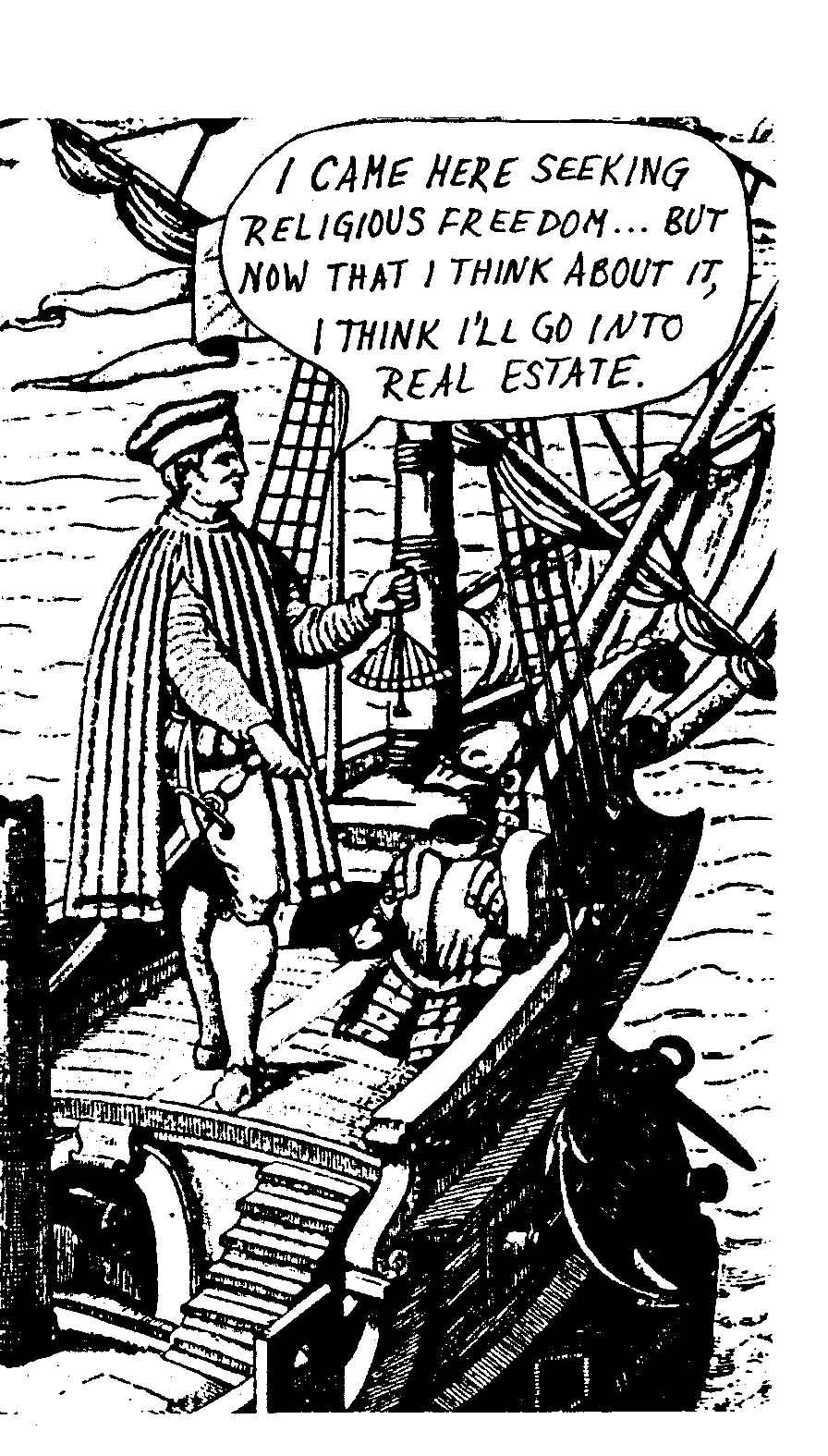 fear if we refuse to look, we may never grasp this backdrop of terror which impinges on us still.) In 1908 sending postcards with photos of lynching victims (some with the caption “Wish you were here”) became so common that the US Postmaster banned the cards.
fear if we refuse to look, we may never grasp this backdrop of terror which impinges on us still.) In 1908 sending postcards with photos of lynching victims (some with the caption “Wish you were here”) became so common that the US Postmaster banned the cards.
¶ Terrorism has punctuated our history since the earliest days of undocumented European immigrants in North America. William Bradford, governor of the early Plymouth Colony, wrote of his Pilgrim community’s battle with the Pequot Indians at Mystic River, beginning with the torching of the Pequot village: “It was a fearful sight to see them thus frying in the fire and the streams of blood quenching the same, and horrible was the stink and scent thereof; but the victory seemed a sweet sacrifice, and [we] gave the praise thereof to God.”
¶ There isn’t a legal consensus on the definition of terrorism. The US Federal Bureau of Investigation defines terrorism as “the unlawful use of force or violence against persons or property to intimidate or coerce a government, the civilian population, or any segment thereof, in furtherance of political or social objectives.” The first problem with this statement is the adjective “unlawful,” which implies that governments can’t be charged with terrorism. And then there’s the fact that more than a few actions by colonists fighting loyalists to overthrow British rule of the American colonies were terroristic.
¶ I have stood at the Canadian monument in the Saint John, New Brunswick harbor commemorating the British loyalists who fled there from the American colonies during the US Revolutionary War after persecution—some instances of which would be judged war crimes by the International Criminal Court—at the hands of pro-independence insurgents.
¶ To fight terrorism by military means . . . is like hitting a fully grown dandelion with a golf club. —John Paul Lederach
¶ In Errol Morris’s Oscar-winning 2003 documentary, The Fog of War: Eleven Lessons from the Life of Robert S. McNamara, the former US Secretary of Defense—remembered as the chief architect of the war in Vietnam and later combating global poverty as head of the World Bank—is portrayed as “a figure at one moment horrifying and at the next startlingly human,” writes Chris Herlinger in a Religious News Service story.
“The horror comes as McNamara reflects on his role as a military aide to General Curtis E. LeMay in the firebombing of Japan in World War II. McNamara practically leaps into Morris’s camera and loudly declares: ‘On [a] single night, we burned to death 100,000 Japanese civilians in Tokyo—men, women and children.’
“The human, even vulnerable, moment comes with the candid acknowledgment that LeMay had later told the young McNamara, ‘If we’d lost the war, we’d all have been prosecuted as war criminals.’ ‘And I think he’s right [McNamara said]. . . . What makes it immoral if you lose, and not immoral if you win?’” —"McNamara’s Conflicts on War, Peace, Morals, Ethics," Christian Century
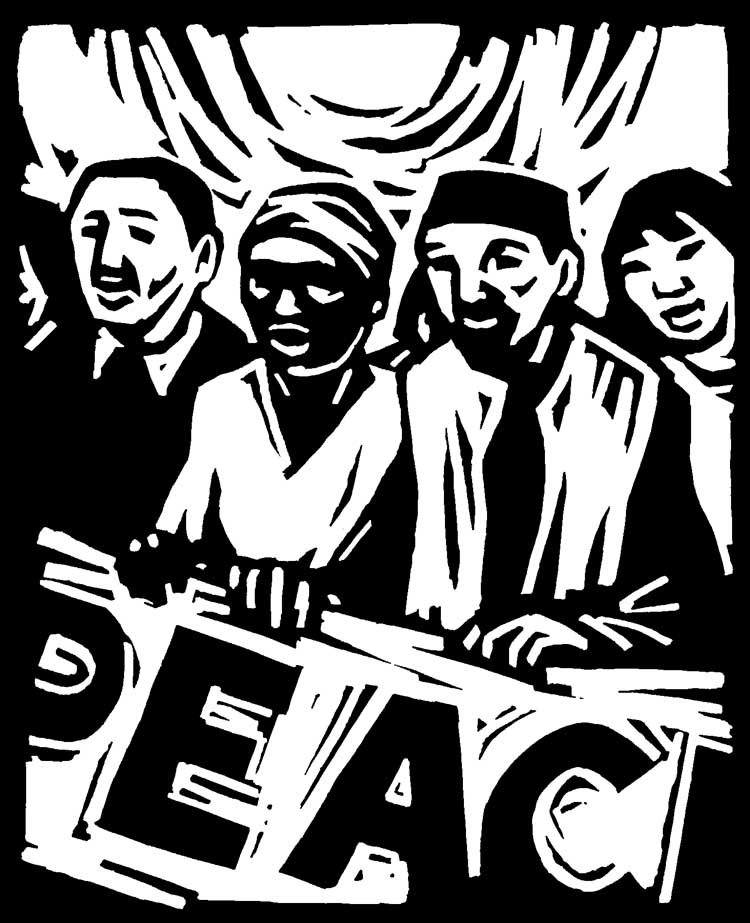 ¶ Drone terror. “‘Drones [which can hover for hours, even days, over a potential target] may kill relatively few, but they terrify many more,’ Malik Jalal, a tribal leader in North Waziristan, told me. They turned the people into psychiatric patients. The F-16s might be less accurate, but they come and go.” The sound made by Predator and Reaper drones can be heard from the ground like a flat buzzing noise. —Steve Coll, “The Unblinking Stare: The drone war in Pakistan, The New Yorker
¶ Drone terror. “‘Drones [which can hover for hours, even days, over a potential target] may kill relatively few, but they terrify many more,’ Malik Jalal, a tribal leader in North Waziristan, told me. They turned the people into psychiatric patients. The F-16s might be less accurate, but they come and go.” The sound made by Predator and Reaper drones can be heard from the ground like a flat buzzing noise. —Steve Coll, “The Unblinking Stare: The drone war in Pakistan, The New Yorker
At left, ©Julie Lonneman, used with permission.
¶ One of the earliest records of a suicide attack is the story of Samson in Hebrew Scripture: “Then Samson said, ‘Let me die with the Philistines.’ He strained with all his might; and the house fell on the lords and all the people who were in it. So those he killed at his death were more than those he had killed during his life” (Judges 16:30).
¶ The Roman senator and historian Tacitus, quoting the words of the Caledonia, Calgacus, describing the Roman imperium: “Robbery, butchery, rapine, the liars call Empire; they create a desolation and call it peace.”
¶ We forget that Menachem Begin, former Prime Minister of Israel who in 1979 famously signed the Camp David Accord peace treaty with Egyptian President Anwar Sadat (both of whom shared the Nobel Peace Prize for this diplomatic breakthrough), was the commander in 1946 of Irgun, a Jewish paramilitary group (freedom fighters? terrorists?) in Palestine, which bombed the Jerusalem’s King David Hotel in Jerusalem, killing 91 people, and in 1948 massacred over 100 Palestinian Arabs in the village of Deir Yassin.
¶ We forget that the requirement of Jews to wear round, yellow “Jew badges” did not originate with the Nazis. It was the church’s Fourth Lateran Council of 1215 who set this standard.
¶ The contemporary use of the term “terrorism” can be traced to the French Revolution (1789-1799). After its initial honeymoon with humanitarian values—“liberty, equality, fraternity”—political infighting turned into a bloodbath (la Terreur–the Terror): 16,594 executed by guillotine, another 25,000 by other forms of executions.
¶ “In Iraq, when we first started, the question was, ‘Where is the enemy?’ That was the intelligence question. As we got smarter, we started to ask, ‘Who is the enemy?’ And we thought we were pretty clever. And then we realized that wasn't the right question, and we asked, ‘What's the enemy doing or trying to do?’ And it wasn't until we got further along that we said, ‘Why are they the enemy?’” —General Stanley McChrystal (ret.), former head of US forces in Afghanistan, in “Generation Kill,” interviewed by Gideon Rose in Foreign Affairs
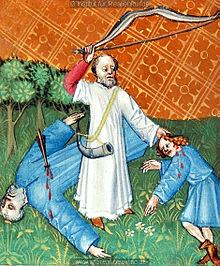 ¶ Arguably the first terrorist threat came from Lamech, sixth generation descendent of Cain (who committed the first murder recorded in Hebrew Scripture): Lamech said to his wives: "Adah and Zillah, hear my voice; you wives of Lamech, listen to what I say: I have killed a man for wounding me, a young man for striking me. If Cain is avenged sevenfold, truly Lamech seventy-sevenfold" (Genesis 4:23-24). Do you see how violence easily becomes a self-perpetuating cycle?
¶ Arguably the first terrorist threat came from Lamech, sixth generation descendent of Cain (who committed the first murder recorded in Hebrew Scripture): Lamech said to his wives: "Adah and Zillah, hear my voice; you wives of Lamech, listen to what I say: I have killed a man for wounding me, a young man for striking me. If Cain is avenged sevenfold, truly Lamech seventy-sevenfold" (Genesis 4:23-24). Do you see how violence easily becomes a self-perpetuating cycle?
¶ “No matter how cynical you get, it is impossible to keep up!” —Lily Tomlin
¶ “In the Bible, there is really only one story: that of a people struggling to leave empire behind and set out to follow God.” —Wes Howard-Brook and Anthony Gwyther, Unveiling Empire: Reading Revelation Then and Now
¶ Lee Griffith’s The War on Terrorism and the Terror of God (2002) is on my top-ten list of the most important books I’ve read in my lifetime. It’s far and away the best book I know combining historical recollection, social analysis, biblical insights and theological reflection. (Presciently, his finished manuscript was at the publisher on 11 September 2001—so they asked him to add a postscript.)
Below are a few quotes from the book.
¶ “The actions of a European power in invading and colonizing another nation is not terrorism because it is an action by a state, but any violent objections from colonized people are now grist for study as ‘terrorism.’” —Lee Griffith, The War on Terrorism
¶ “It was not ‘Muslim extremists’ who brought horror to Rwanda; it was Christians killing other Christians. It was not some ‘demonic’ cult group who planted bombs in Northern Ireland; it was Christians trading brutality with other Christians. It was not ‘atheistic communists’ who instituted a reign of terror to enforce apartheid in South Africa; it was Christians kidnapping and torturing and murdering other Christians.” —Lee Griffith, The War on Terrorism
¶ Whatever human natural inhibitors to aggression, “these are totally subverted by the distance modern weaponry places between the attacker and the victim. So, perfectly good natured people who would not dream of spanking a child can drop incendiary bombs which maim and kill dozens of children.” —Lee Griffith, The War on Terrorism
Art at right ©Julie Lonneman, used with permission.
¶ Or Hellfire missiles launched from Predator drones. It’s estimated that 200 children have been collaterally damaged (i.e., killed) by US drone strikes. Does the fact that we don’t see them (unlike video of 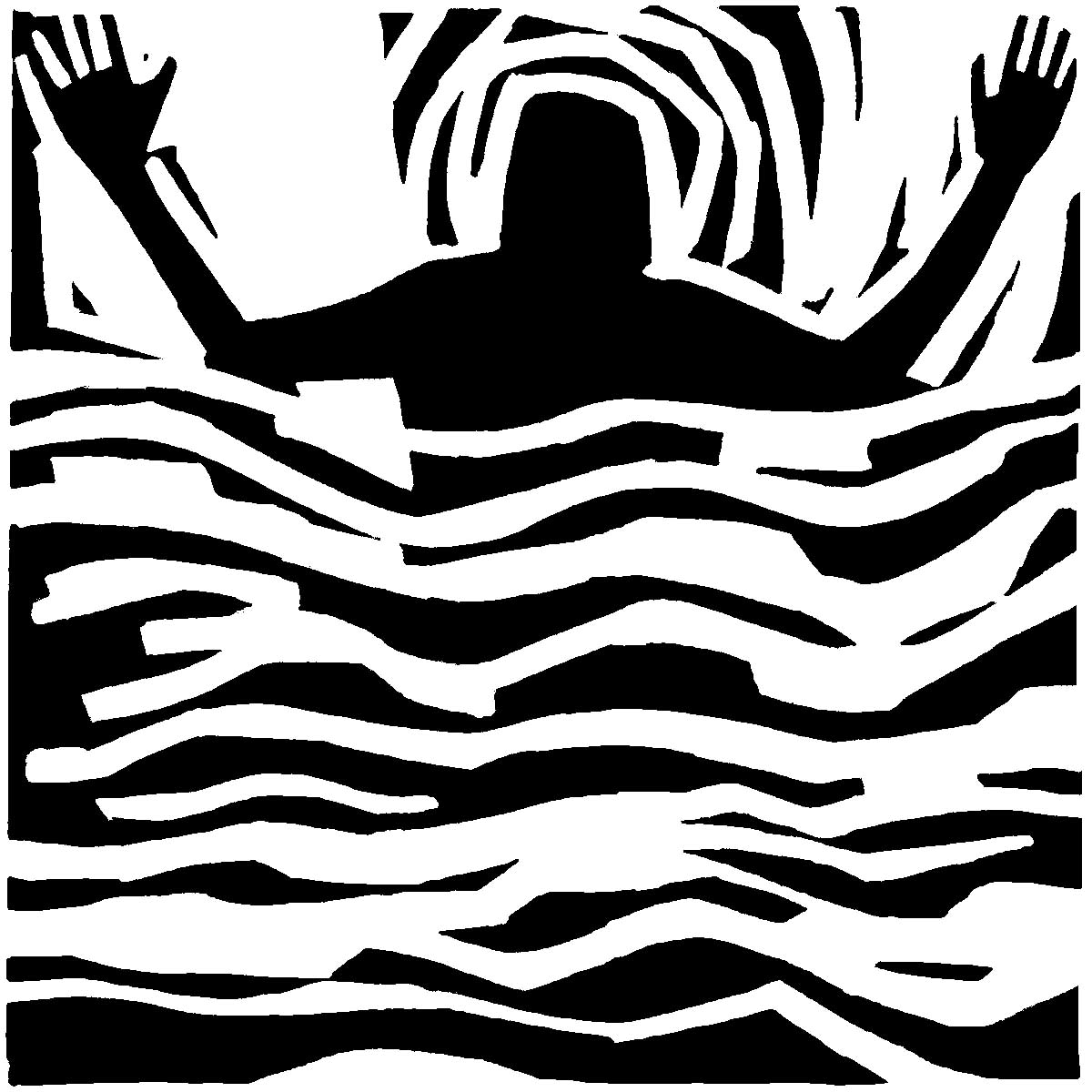 ISIS’ beheading of 15 people) make this more tolerable?
ISIS’ beheading of 15 people) make this more tolerable?
¶ Benediction: “And above all, take hope in Christ crucified and resurrected. It is the resurrection which is the terror of God to all who believe that death should have the final word. It is the promise of the resurrection which renders null and void the victories of all who shed blood.” —Lee Griffith, The War on Terrorism
Featured in this issue:
•“Testimony in a Time of Terror,” a litany for worship
•“Epilogue,” Dreaming God’s Dream: Celebrating the Life and Legacy of Martin Luther King Jr.
©Ken Sehested, prayerandpolitiks.org. Language not otherwise indicated above is that of the editor.
Special note from the editor: I relinquished my pastoral staff duties with Circle of Mercy Congregation as of this month, to focus on writing and maintenance of this site. In many ways, this is my dream job. Unfortunately, it doesn't come with built-in income. I hope—eventually—to get a modest part-time salary from prayer&politiks readers. I hope—eventually—you will consider this resource worthy of your dollars. Just as much, however, I need visibility for this site. You can provide enormous help by circulating the link, along with your personal recommendation, to friends and acquaintances you think might be interested.
In the immortal words of Guy Clark (Cold Dog Soup):
There ain't no money in poetry
That's what keeps the poet free
I've had all the freedom I can stand.

